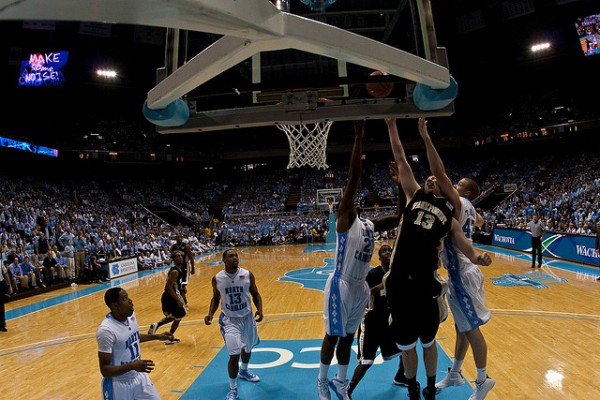Wake Forest Sticks to the Script and Loses Badly on the Road
Posted by KCarpenter on February 6th, 2013Kellen Carpenter is an RTC correspondent. He filed this report after last night’s game between UNC and Wake Forest in Chapel Hill.
So far in conference play, Wake Forest has shown that it can’t make or defend shots. This isn’t a slight against the hardworking Demon Deacons, but just what the numbers have revealed. Since the beginning of conference play, Wake Forest has been the worst team on both ends of the floor in terms of effective field goal percentage. The team averages a meager 43.9% on offense while allowing opponents to shoot 53.9%. They have yet to win a conference road game. After a blowout loss against North Carolina last night, very few of these facts have changed.
In the 87-62 rout, North Carolina managed an eFG% of 58.9% while Wake Forest managed only 45.4%. Things like offensive rebounds and turnovers can change some of the conditions of the game, but one essential truth stands: You have to be able to put up more points than your opponent, and right now, Wake Forest can’t do that. Sure, the Demon Deacons have a pair of good home wins against NC State and Virginia (good-ish, I should probably say), but those look more and more like aberrations. After the game, Wake head coach Jeff Bzdelik said, “We always lose our confidence quickly… you can see it in [the players’] eyes.” In a frank discussion with the media he admitted that his team wasn’t mentally tough enough, and as head coach, that responsibility lay with him. Bzdelik looked grim and almost too ready to explain all the things he and his team did poorly, seemingly at a loss to figure out how to fix the team’s problems, explaining how much of a focus cutting down on turnovers was in the lead-up to this game. “The emphasis was not turning the ball over and obviously we didn’t do a good job.”
In the first half, Wake Forest had nine made field goals and 13 turnovers. In the final 5:54 of the half, the Deacons couldn’t score a single basket and had four turnovers. With a 20-point lead going into the second half, North Carolina was firmly in the driver’s seat and never looked back. For Roy Williams’ team, this game marked the first time in several games that both Leslie McDonald and P.J. Hairston were back in the lineup at the same time, offering the Tar Heels an option for a deadlier perimeter attack. Led by Reggie Bullock’s 4-of-5 makes from beyond the arc, North Carolina’s perimeter shooters managed to shoot 60% on their 15 three-pointers attempted. With Wake Forest conversely going 2-of-18 from deep, the hot shooting was a big advantage for the Tar Heels.
It’s a good thing too, because as well as North Carolina played, the problem of the second big man other than James Michael McAdoo is still unresolved. Jackson Simmons played big minutes in the first half, but he, like Brice Johnson, remain defensive liabilities while Desmond Hubert and Joel James are rather limited offensively. Hubert continues to start, but he played fewer minutes than any of the other three. With the return of Hairston and McDonald to the lineup, it seems that Williams will lean more heavily on smaller lineups. Even in the context of last night’s strong team performance, though, North Carolina struggles to guard talented, physical bigs. The lone bright spots of the night for Wake Forest were Devin Thomas and Arnaud Adala Moto, two forwards who opportunistically made the most of their chances on the interior. Thomas scored 11 points and had 13 rebounds while Adala Moto had 13 points on 5-of-6 shooting in a mere 20 minutes.










































